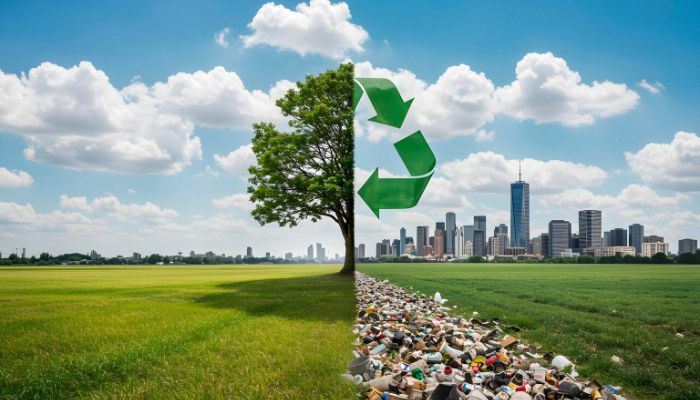India faces a persistent challenge of waste accumulation, with approximately 9.3 million tonnes of plastic generated annually—accounting for nearly 20% of global plastic emissions. In addition, the country produces about 2 million tonnes of electronic waste each year. While this presents a significant environmental concern, it also offers a valuable opportunity for new business ventures. The growing focus on waste management has led to the rise of innovative startups, which not only address sustainability challenges but also generate employment for local communities.
Union Minister for Road Transport and Highways, Nitin Gadkari, has emphasized this potential, noting that India’s municipal waste, when effectively converted into usable products, could transform into a business worth ₹5 crore.
This article explores government initiatives in waste management, highlights thriving startups in the waste treatment ecosystem, and provides practical insights for professionals and budding entrepreneurs to build sustainable businesses while creating local employment opportunities.
Government Initiatives
The Waste to Wealth Mission, launched by the Government of India on August 17, 2020, aims to transform the country into a zero-waste, landfill-free nation. The mission focuses on identifying and validating innovative technological solutions and business models capable of driving sustainable waste management. Among its notable achievements are the deployment of the Drain Master DM-80 excavator in Delhi, awareness campaigns reaching nearly 300,000 citizens on waste management practices, and the successful implementation of around 80 waste treatment technologies out of 800 evaluated as of December 2024.
In the state of Assam, efforts are underway to scale up solid waste management capacity with plans to establish 13 new plants by December 2025. This initiative is expected to enhance the state’s waste processing capacity to 650 tonnes per day (TPD). Additionally, the Zero Waste, Zero Hunger scheme in Tinsukia addresses food insecurity by packaging and distributing surplus food from hotels, canteens, and restaurants, thereby feeding more than 100 homeless individuals daily.
Similarly, the Bihar state cabinet has approved a budget allocation of ₹514.58 crore for setting up an integrated solid waste management facility at Ramchak Bairiya. Once operational, the facility is projected to process 1,600 tonnes of waste per day, significantly improving waste management infrastructure in the state.
Startups in the Waste-Management Ecosystem
Several innovative startups and community-driven initiatives in India are redefining sustainable waste management while generating significant employment opportunities.
Recykal
Headquartered in Hyderabad, Recykal operates an e-commerce platform that connects over 675 waste recyclers, 620+ brand owners, 5,000+ aggregators, and urban local bodies across the waste management value chain. By integrating Google’s CircularNet AI into its supply chain, Recykal has enhanced the recyclable value of products by sixfold, preventing nearly 50,000 MT of waste from reaching landfills each month. Its Samudra Manthan initiative, aimed at combating ocean plastic pollution, has successfully collected 70,000 MT of plastic across 207 districts in 19 states.
Without (by Ashaya)
Based in Pune, Without focuses on transforming hard-to-recycle metallised multi-layered plastics (MLPs) into recyclable materials and consumer products through a chemo-mechanical recycling process. Among its unique achievements is the creation of the world’s first sunglasses made from recycled MLP. The company directly employs informal waste collectors, providing them with formal wages and health benefits. Additionally, 10% of its sales revenue supports the education of waste collectors’ children. In recognition of its innovation in sustainable chemistry, Without was named Start-up of the Month (May 2023) by the International Sustainable Chemistry Collaborative Centre (ISC3).
Phool
Founded in 2015, Phool addresses the issue of water pollution caused by temple flower waste through a process called “flowercycling.” The company transforms discarded flowers into eco-friendly products such as Mitti (vermicompost), charcoal-free incense, Florafoam (biodegradable packaging material), and Fleather (vegan leather). At its core, Phool empowers marginalized women by offering formal wages and health benefits. Operating across multiple cities, it processes approximately 2.4 tonnes of flower waste daily from temples in Uttar Pradesh. Phool received the UN Momentum for Change Award (Climate Action) in 2018 for its pioneering flower waste recycling initiative.
Plastic Weaving in Dharavi
During Mumbai’s plastic wire crisis, NGOs such as the ACORN Foundation India and Apnalaya initiated training programs for around 200 local women, enabling them to weave discarded plastics into artisan products. These handcrafted goods are sold at domestic craft fairs, showcased at the Kala Ghoda Arts Festival, and exported to international markets including Germany, Japan, and the UK.
Tips for Emerging Entrepreneurs
- Research your local ecosystem
Thoroughly analyze the types of waste accumulating in your area. Identify the ones that can be converted into eco-friendly or recyclable products. Create a detailed blueprint covering sourcing, operations, cost estimates, revenue models, and rollout strategies. - Obtain legal registration & compliance
Register your business as an MSME on the UDYAM portal and secure mandatory licenses for GST, pollution control, and trade. Staying compliant builds credibility and ensures smoother operations. - Leverage government schemes
Tap into government programs like MSME Innovation & Incubation and Design Clinic Scheme for financial aid. Specialized initiatives such as the Swachhata Startup Challenge and AIM’s New India Challenges provide funding, mentorship, and incubation support tailored for waste management startups. - Build your network
Forge partnerships with municipalities and Urban Local Bodies (ULBs) for sourcing waste materials. Integrate informal waste collectors into your supply chain, offering them formal wages and benefits. Collaborate with startups, NGOs, and design firms to share resources, co-create product designs, and expand distribution networks. - Incorporate circularity in the business model
Embed principles of reuse and recycling into your product design. Develop reverse-logistics frameworks to reclaim materials, lower production costs, and form a sustainable business. - Implement a 360° marketing strategy
Use both digital and offline channels to maximize outreach. Engage influencers, participate in trade fairs, and leverage social media, blogs, and eco-markets for brand visibility. Track campaign analytics and continuously optimize strategies to boost engagement and sales.
India’s growing waste accumulation, while a pressing challenge, also represents a powerful opportunity for new business ventures and widespread job creation. By tapping into government schemes and embracing sustainable innovation models, young professionals and entrepreneurs can build startups that not only address environmental concerns but also drive economic growth. Formalizing waste collection and recycling can generate significant employment opportunities while strengthening the livelihoods of local communities.
Ultimately, by transforming waste into wealth, India can simultaneously foster entrepreneurship, generate jobs, and move closer to a cleaner, more sustainable future.






